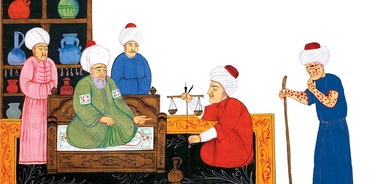- Home
- Our Purpose At Ie University
- Knowledge At Ie University
- Universities, Knowledge, And Arab Physicians
Universities, Knowledge, and Arab Physicians

Just as universities are fundamental to the success of the fight against pandemics due to their role in education and knowledge transmission, many other elements have also contributed to this shared success. Among them, Arab physicians. We take a look at the history of Arab medical knowledge sharing.
by Gonzalo Rodríguez Marín, Coordinator of the Saudi-Spanish Center for Islamic Economics and Finance (SCIEF) at IE Business School.
Disease and pandemics have always plagued humankind. The heroes who are caring for us today and trying to save the lives of the sick do so by applying wisdom passed down to them through knowledge acquired over millennia. Universities play a fundamental role in this process that should always be acknowledged.
Knowledge belongs to no one; rather, it is the success of the commons, of a universal community in constant contact, susceptible to disease but also to wisdom.
Just as universities are fundamental to the success of the fight against pandemics due to their role in education and knowledge transmission—which are essential for controlling extreme situations like the one we are currently facing—many other elements have also contributed to this shared success. Among them, Arab physicians.
Doctors and philosophers
The Persian Islamic scholar Muhammad al-Bukhari[1] recorded the following 7th-century hadith[2] (prophetic tradition) concerning a plague outbreak and how to deal with a situation like the one we now face:
“If you hear of an outbreak of plague in a land, do not enter it; but if the plague breaks out in a place while you are in it, do not leave that place.”
Arabic or Islamic medicine had a very important historical role that most people may be unfamiliar with. This medical tradition played a fundamental role in the transmission and improvement of medical knowledge between classical antiquity and the Renaissance.
The expansion of the Arabian empire starting in the 7th century CE and the creation and homogenization of an Islamic society in much of the known world was an opportunity for the development of medicine, building on the knowledge and principles of Greco-Roman medicine and philosophy.
The Arabic language also played a key role in this process. The homogenization of an empire or society undoubtedly requires a deeply rooted common language, like Latin during the Roman Empire and later Spanish during the Spanish Empire.
Transmitter of wisdom
The Arabic language, like English today, served as a transmitter of wisdom. The most important works of medicine written in Persian, Greek, and Sanskrit were translated into Arabic in the early 10th century. Arabic was the language of transmission, study, and discussion of knowledge. Across the Islamic world—from Córdoba, the capital of Al-Andalus, to Cairo, to Kairouan in Tunisia, to Fez in Morocco—universities and educational institutions safeguarded and expanded medical and universal knowledge for several centuries.
There are countless examples of Arab physicians who picked up this tradition and left their mark on it. In Al-Andalus alone, due to its cultural and emotional proximity, we can highlight Averroes, the Andalusian philosopher and physician who authored a medical encyclopedia; Avenzoar, who improved the procedure of tracheotomy and discovered the causes of scabies and pericarditis; and Avicenna, author of The Canon of Medicine, one of the most famous books in the history of medicine, in which, among many other innovations, he hypothesized that water and air might contain tiny organisms that could be vectors of infectious diseases.
______
[1] Muhammad al-Bukhari (810-870) was a famous Islamic scholar of Persian descent and one of the most respected compilers of hadith. His hadith collection is considered by Sunni Muslims to be second only to the Quran in terms of authenticity.
[2] Hadith (in Arabic حديث ḥadīṯ, “narration” or “reference”) literally means a saying or a conversation. In Islam, hadith are the sayings and actions of the Prophet Muhammad (and also the Imams, in Shia Islam) as recounted by his companions and compiled by the sages who succeeded them.